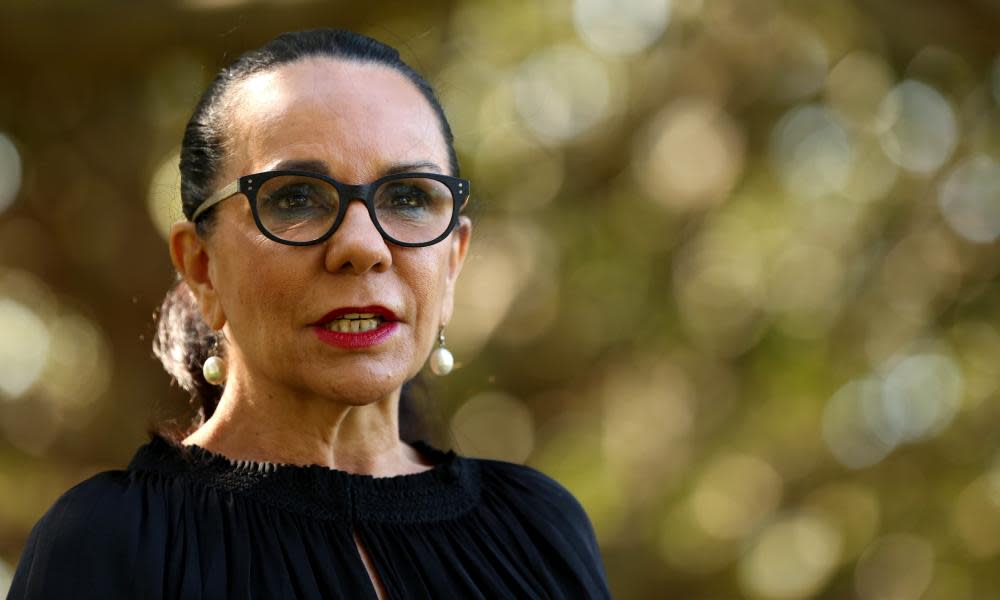Labor still hoping for bipartisan position on Indigenous voice to parliament

The shadow minister for Indigenous Australians, Linda Burney, says Labor will persist with trying to land a bipartisan position on the voice to parliament and constitutional recognition even if the Coalition refuses in the first instance to enshrine the voice in Australia’s founding document.
Ahead of a dinner on Wednesday night with the minister for Indigenous Australians, Ken Wyatt, scheduled to discuss where the process is up to, Burney told Guardian Australia the major parties had different points of view. But she said Labor would be guided by the results of a co-design process Wyatt wanted to establish rather than sinking the process at the first hurdle.
Wyatt signalled publicly last week he was about to take “a series of propositions to do with constitutional recognition, the voice and truth telling” to Scott Morrison for his approval. Guardian Australia understands the government will unveil a proposed co-design process with Indigenous people over the coming week or two.
Related: Ken Wyatt says he has Indigenous voice to parliament plan for Scott Morrison
“The prime minister has said he will have a referendum this term on recognising Aboriginal people in the constitution, but not enshrining a voice within the constitution,” Burney told Guardian Australia in an interview.
“Labor’s position is we embrace the three elements of the Uluru statement – constitutional recognition, the Makarrata Commission … and the third element, which I think is critically important, is the national process of truth telling.
“Clearly the two parties have very different points of view.”
Wyatt has indicated the government will not pursue a model of the voice to parliament that is enshrined in the constitution, which was the proposal from the Uluru statement. But Burney speculated the Morrison government might countenance a two-stage process.
“I’m just wondering whether or not the prime minister has in his mind that perhaps he would look at enshrinement down the track – I don’t know,” she said.
Burney warned the entire push, unveiled by Wyatt during Naidoc week, would founder if the major parties couldn’t come to terms. “This is going to be lost if we can’t get a bipartisan position.
“Even if Labor is successful at the next election, the conservatives have traditionally opposed ideas Labor has put forward for referendum change, bar one.”
She said even though Labor supported a position where the voice to parliament was enshrined in the constitution, rather than being legislated, which makes the representative body more vulnerable to abolition, she would aim to be constructive during the co-design process. “We will be informed by the co-design process, but it needs to get cracking, and we will be instructed by what First Nations people say.”
Burney predicted the Indigenous leadership would go one of two ways. “People will either say it’s an enshrined voice or nothing – what have we got to lose? Or they will say we will wear a legislative voice providing there is something down the track. I reckon that’s what people will say.
“People are clutching to constitutional enshrinement to provide security and certainty. The big question is does constitutional enshrinement really provide that? I think that’s a moot point quite frankly.”
She said her message to both Wyatt and Morrison was “time is of the essence”. Burney said if the government wanted to hold a referendum ahead of the federal election in 2022, then there wasn’t much time to conduct a meaningful co-design process, get enabling legislation together and conduct a public awareness campaign.
She said the voice to parliament had to come from a regional base, otherwise it would not have legitimacy. “That takes time. You can’t have a national body that’s handpicked. It has to be democratically elected with legitimacy in the Indigenous community.”
Related: Dreaming of a voice to parliament: Spinifex Gum sing their way into stony hearts
There also had to be time to communicate any proposal to non-Indigenous Australians. “All Australians have to see the opportunity for, dare I say, nation building.”
Wyatt will dine on Wednesday night with Burney and fellow Labor parliamentarians Pat Dodson, Malarndirri McCarthy and Warren Snowden, as well as the Senate crossbencher Jacqui Lambie.
The former chief justice Murray Gleeson has argued “a constitutionally entrenched but legislatively controlled” capacity for Indigenous people to have input into the making of laws about Indigenous people or Indigenous affairs should not be a controversial idea.
But a move by Wyatt earlier this year to put the voice back on the national agenda sparked an immediate backlash inside the government, with conservatives resisting the proposal even if the voice sat outside the constitution.
The Liberal MP Craig Kelly told Guardian Australia setting up separate structures, even if the representative model was legislated, risked creating “a reverse form of what South Africa was a few years ago”.

 Yahoo News
Yahoo News 